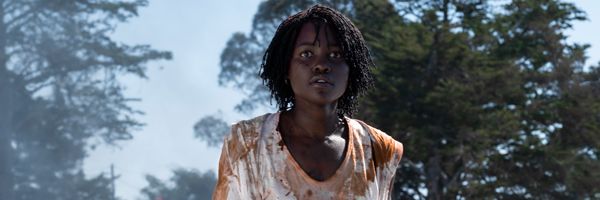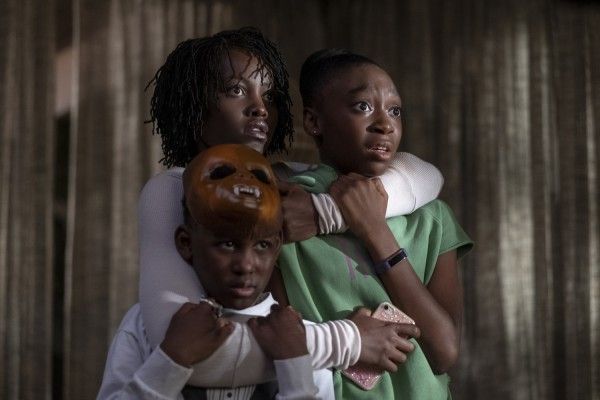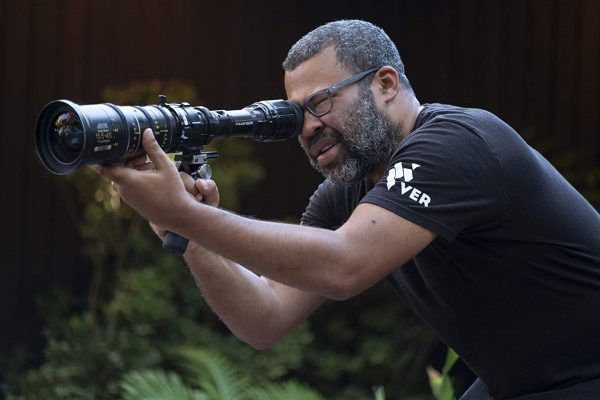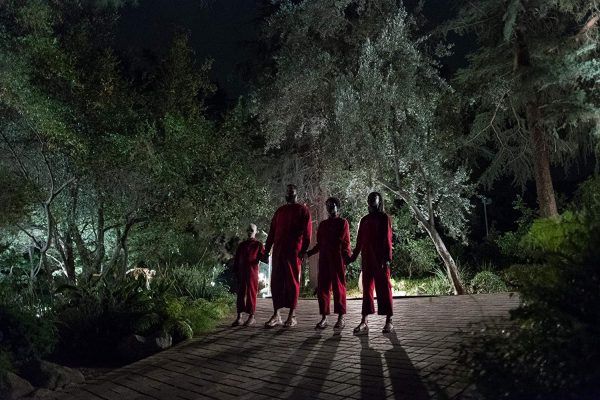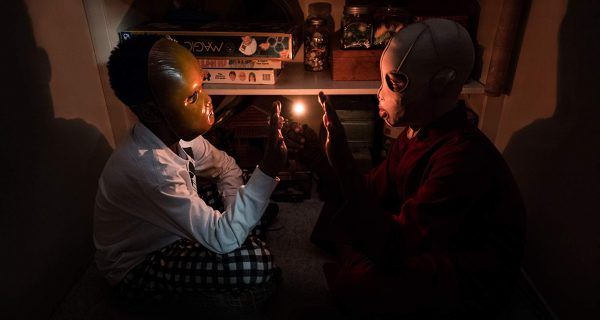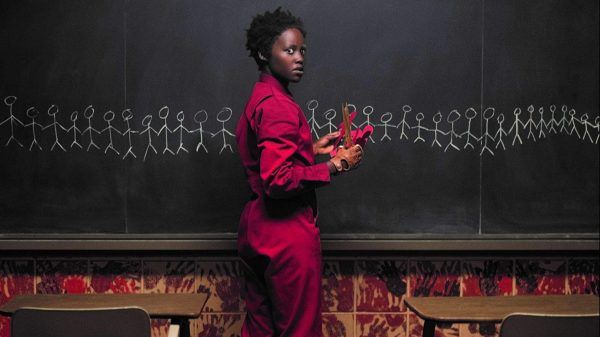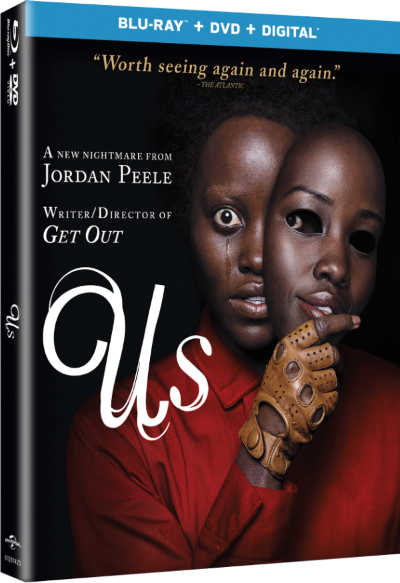It's not often that you find yourself in the movie theater and realize you're listening to an iconic horror score in the making, but that's exactly what happened when Jordan Peele cued up the track "Pas De Deux" in the climax to his newest horror hit, Us. The dopplegänger horror boasts a score full of tracks bound to end up on all the best Halloween playlists; the kind of catchy yet unnerving themes that you can't quite stop humming after the movie, even if they send a chill up your spine. Get Out composer Michael Abels reunited with Peele for his sophomore feature, and the duo once again tapped into a horrifying and soundscape distinctly all their own.
With Us available on Blu-ray this week, I recently hopped on the phone for a chat with Abels to discuss working with Peele and how he conceived the score. He talked about what makes music scary, how Peele worked with him early on to bring the dissonance of dopplegänger horror to the music, building tension without giving away the scares, and how he introduced himself to horror with a terrifying trip to the cinema.
Well, I just want to start by saying a very genuine congratulations. I think this a very special horror score, and I think Pas De Deux is one of those iconic horror tracks in the making.
ABELS: Wow. Well, thank you so much. I really appreciate that a lot.
I really mean it. It's like one of those things when you watch a movie, and you just feel something special from the music, and I feel like that's so ephemeral and hard to pin down. When it comes to filmmaking, there are like blunt visual cues that can tell you something's scary, right? Like blood or masks or a weapon, and I'm curious, what do you think makes music scary?
ABELS: The very first time I met Jordan, we had a talk about this exact thing, and I would just say it's the unexpected. I mean, it's true with sound in general, but especially with music. It's something that it maybe sounds familiar, but you don't know what it is. Like when something's outside your house and makes a sound, if it's the air conditioner or something that's making a sound, you're like that's whatever, but when you don't know what it is, you're instantly going, "What is that?" It's the same way with music.
You and Jordan Peele, with Get Out and then Us, both of you kind of set out on a career-altering journey together. I'm curious, what is your collaborative process like with him, and how did it grow and evolve since Get Out?
ABELS:It was actually similar for both films in that he talked with me before the film was even shot, and wanted to hear some ... and talked in broad terms about the themes of the film, and the feel and look of it, and wanted some musical ideas going in, like kind of musical pre-production.I was all for that,because it's great to be able to feel like you're designing a storytelling world along with the filmmaker, and so I did that. The difference with Us was that I did even more of it at the beginning, I did even more demos of different possibilities for him, not even knowing ... I mean, I had read the script, but I had no belief that they would go in any particular scene necessarily. I just numbered the ideas and I gave them to him to listen to, and I just figured if he liked any of them that he would let me know.
What are some specifics he gave you to reference or include in this one?
ABELS:Well, for Us, he said, so obviously it's about duality, so why don't you just some play with some instruments that maybe wouldn't belong together,that are kind of opposites. Just try that as a jumping off point, and so I did. Some of that music ... it's just like the film evolved as it went into production, and that music evolved, and I don't know that there's exact instances of ... there's still a couple in the score, but a lot of times that music was a jumping off point for something that we liked or that was working, and then I expanded on that in a way that works specifically for the film. I mean, I know that there's a track called Beach Walk that is almost note-for-note one of the original demos, and it was one of my experiments in instruments that don't belong together. There are a couple others that just grew out of my pure experimentation.
What are the instruments in Beach Walk that are contrasting?
ABELS:What's going on in Beach Walk there's a kalimba, which is playing, it's not quite a 12 tone row. The kalimba's playing a scale that the kalimba would never play in its traditional music. There's a berimbau, which is a South American instrument, and then there's a didgeridoo, which is being played in a way that's so percussive it actually sounds like a drum. You can tell that I was deliberately pulling from cultures that don't need accepting in world travels, and just seeing what they sounded like together. I wasn't even trying to say, okay, now we're scoring this scene. It was just about experimentation.
As you've gone on this new sort of career path, how has composing for film specifically maybe altered or expanded your perspective as a musician? Or altered your creative process?
ABELS: That's a really great question. I think in concert music you’re expected to bring your vision to the piece, and ultimately the piece may not be well received. But your vision... We'll start with your vision. In film music, you're writing music for a director. And the film is the director's vision. And yet you're expected to be very creative, but you need to be creative in the service of that vision. You need to constantly be bringing your A game and also constantly be looking to make sure that it's telling the story the way that the director wants the story told. And that's I think the single biggest difference in the two.
We talked a little bit about what makes music scary, but I'm also curious about how you play with tension and foreshadowing in a way that also doesn't give away the scare that's coming.
ABELS: Oh, we actually talk about that a lot, because without music, you watch a scene, you don't know how much foreshadowing is supposed to be happening in the score. And some times I can get it wrong, or my choice of how to do that is different than what the director wants. There have been times when Jordan has said, "There's too much ... you're giving away the scare," and then other times when he says, "No, I need this to be ramped up more, really let them have it here." So, you do that by ... some of it is simply where the music enters. There's certain really scary moments where the music doesn't foreshadow at all specifically, and then other times it's kind of the quality of the harmony of the music and how dissonant and unhappy and anxiety-ridden the music feels.
Were you before you started working with Jordan, were you already a horror fan? Did you have a catalog of favorite horror soundtracks? Or did you have to kind of dig into that world and do some learning on it?
ABELS: No, I was the type as a kid who would ... when the fire engine came by, I would run to the other room because the noise was so scary. You can imagine I was going nowhere near a horror movie. But actually, there was a time when I was in college, I thought, "You know, if I ever get asked to score a film, it's probably going to be a horror movie and I need to snap out of it." So, I went to see a triple feature back when you could do that sort of thing. Then I had nightmares all night like I always did when I saw anything scary. But I must say, it kind of cured me. So, after that, I was able to take myself out of the horror just a little enough to appreciate the film.
So, films like The Shining which is so terrifying, I could really just appreciate what incredible filmmaking it was for me to be so terrified. And that was a step.
I know I'm out of time with you, but I’m going to sneak in one very quick question. What is to you the scariest piece of music ever written?
ABELS: Wow. I'll tell you ... I don't know if it's the scariest, but my earliest memory of any music ever is a piece by Edvard Grieg called In The Hall of the Mountain King. And it terrified me as an infant and I didn't even know the story behind the music, but it was clearly something not good was happening. And it stayed with me for life.
Us is now available on digital, Blu-ray, DVD, and On Demand. For more on the film, be sure to check ou the links below.
- ‘Us’: How Jordan Peele Used Doppelgängers to Craft an Uncomfortably Familiar Nightmare
- Jordan Peele on ‘Us’, Making Monsters, and the Possibility of a Shared Peele Universe
- ‘Us’ Explained: When the “Why” Is Far More Interesting Than the “How”
- The Best Horror Movies of 2019 So Far
- ‘Us’ Blu-ray Details Promise Six Deleted Scenes & a Bounty of Behind-the-Scenes Features

